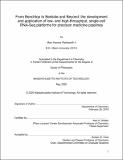| dc.contributor.advisor | Alex K. Shalek. | en_US |
| dc.contributor.author | Wadsworth, Marc Havens,II. | en_US |
| dc.contributor.other | Massachusetts Institute of Technology. Department of Chemistry. | en_US |
| dc.date.accessioned | 2020-09-15T21:57:34Z | |
| dc.date.available | 2020-09-15T21:57:34Z | |
| dc.date.copyright | 2020 | en_US |
| dc.date.issued | 2020 | en_US |
| dc.identifier.uri | https://hdl.handle.net/1721.1/127431 | |
| dc.description | Thesis: Ph. D., Massachusetts Institute of Technology, Department of Chemistry, May, 2020 | en_US |
| dc.description | Cataloged from the official PDF of thesis. | en_US |
| dc.description | Includes bibliographical references. | en_US |
| dc.description.abstract | The development and application of single-cell technologies have revolutionized how we study health and disease. By deconstructing complex biological systems, like human tissues, into the fundamental building blocks of life, single cells, we can not only learn what makes each cell unique (intracellular circuitry) but also investigate how each interaction among them (intercellular circuits) lead to system-level functions. Single-cell approaches have the potential to be particularly crucial for precision medicine pipelines, where comprehensive cellular profiles of system-level functions could be leveraged to guide diagnosis and treatment of disease. Here, to demonstrate the promise of these new technologies, we have developed and implemented single-cell RNA-Sequencing (scRNA-Seq) techniques to profile low-input clinical samples across a multitude of diseases, providing critical insight into how patient-specific scRNA-Seq profiles can help improve clinical treatment. | en_US |
| dc.description.abstract | More specifically, first, we applied scRNA-Seq to dissect the multicellular ecosystem of metastatic melanoma, profiling 4,645 single cells isolated from 19 patients to examine both malignant and nonmalignant phenotypes and their interactions, as well as to propose potential targets for new therapies. Next, to overcome the limitations of low-throughput scRNA-Seq platforms, we developed Seq-Well, a high-throughput platform for low-input clinical samples, that is not only competitive with other scRNA-Seq technologies but also significantly cheaper and portable, enabling the democratization of scRNA-Seq technologies by empowering scientists in high- and low-resource settings. | en_US |
| dc.description.abstract | Finally, we drastically improved the gene and transcript capture of Seq-Well by introducing a step called Second Strand Synthesis (S 3) into the protocol and applied it to construct an atlas of skin inflammation across five conditions, resolving previously unappreciated adaptive and innate cellular phenotypes, as well as propose potential targets for therapeutic intervention unique to each inflammatory disease. Collectively, our work demonstrates the power of scRNA-Seq technologies and how they can be implemented in precision medicine pipelines to improve clinical outcomes. | en_US |
| dc.description.statementofresponsibility | by Marc Havens Wadsworth II. | en_US |
| dc.format.extent | 289 pages | en_US |
| dc.language.iso | eng | en_US |
| dc.publisher | Massachusetts Institute of Technology | en_US |
| dc.rights | MIT theses may be protected by copyright. Please reuse MIT thesis content according to the MIT Libraries Permissions Policy, which is available through the URL provided. | en_US |
| dc.rights.uri | http://dspace.mit.edu/handle/1721.1/7582 | en_US |
| dc.subject | Chemistry. | en_US |
| dc.title | From benchtop to bedside and beyond : the development and application of low- and high-throughput, single-cell RNA-Seq platforms for precision medicine pipelines | en_US |
| dc.title.alternative | Development and application of low- and high-throughput, single-cell RNA-Seq platforms for precision medicine pipelines | en_US |
| dc.type | Thesis | en_US |
| dc.description.degree | Ph. D. | en_US |
| dc.contributor.department | Massachusetts Institute of Technology. Department of Chemistry | en_US |
| dc.identifier.oclc | 1192965924 | en_US |
| dc.description.collection | Ph.D. Massachusetts Institute of Technology, Department of Chemistry | en_US |
| dspace.imported | 2020-09-15T21:57:33Z | en_US |
| mit.thesis.degree | Doctoral | en_US |
| mit.thesis.department | Chem | en_US |
